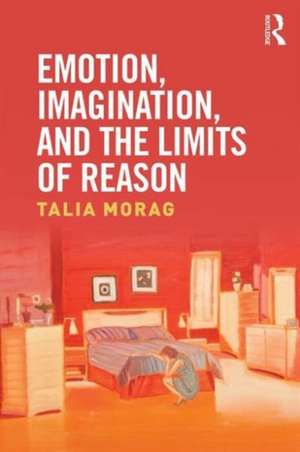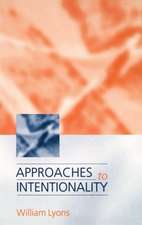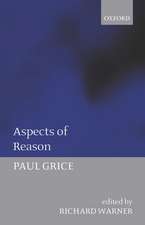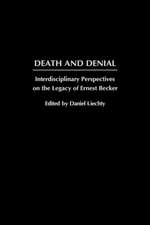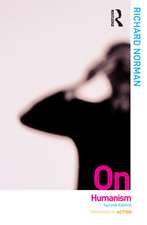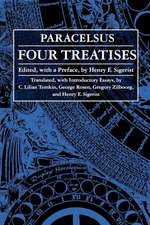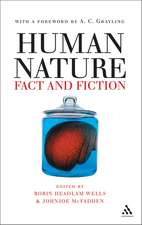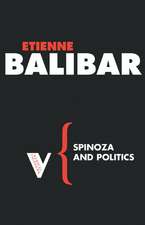Emotion, Imagination, and the Limits of Reason
Autor Talia Moragen Limba Engleză Hardback – 20 iun 2016
Emotion, Imagination, and the Limits of Reason presents a bold new picture of the emotions that challenges prevailing philosophical orthodoxy. Talia Morag argues that too much emphasis has been placed on the "reasonableness" of emotions and far too little on two neglected areas: the imagination and the unconscious. She uses these to propose a new philosophical and psychoanalytic conception of the emotions that challenges the perceived rationality of emotions; views the emotions as fundamental to determining one's self-image; and bases therapy on the ability to "listen" to one’s emotional episode as it occurs.
Emotion, Imagination, and the Limits of Reason is one of the first books to connect philosophical research on the emotions to psychoanalysis. It will be essential reading for those studying ethics, the emotions, moral psychology and philosophy of psychology as well as those interested in psychoanalysis.
| Toate formatele și edițiile | Preț | Express |
|---|---|---|
| Paperback (1) | 370.18 lei 6-8 săpt. | |
| Taylor & Francis – 12 oct 2017 | 370.18 lei 6-8 săpt. | |
| Hardback (1) | 1225.60 lei 6-8 săpt. | |
| Taylor & Francis – 20 iun 2016 | 1225.60 lei 6-8 săpt. |
Preț: 1225.60 lei
Preț vechi: 1290.10 lei
-5% Nou
Puncte Express: 1838
Preț estimativ în valută:
234.53€ • 243.28$ • 195.56£
234.53€ • 243.28$ • 195.56£
Carte tipărită la comandă
Livrare economică 27 martie-10 aprilie
Preluare comenzi: 021 569.72.76
Specificații
ISBN-13: 9781138656949
ISBN-10: 1138656941
Pagini: 298
Dimensiuni: 156 x 234 x 22 mm
Greutate: 0.54 kg
Ediția:1
Editura: Taylor & Francis
Colecția Routledge
Locul publicării:Oxford, United Kingdom
ISBN-10: 1138656941
Pagini: 298
Dimensiuni: 156 x 234 x 22 mm
Greutate: 0.54 kg
Ediția:1
Editura: Taylor & Francis
Colecția Routledge
Locul publicării:Oxford, United Kingdom
Public țintă
Postgraduate and UndergraduateCuprins
Introduction
Part 1
1. Emotions as judgments or as modes of "seeing-as": The explanatory challenges toward a causal account for emotional episodes
2. The sub-personalist accounts
3. The "primal scene" accounts: developmental etiologies
4. The primal memory accounts: the narrative approach
Part 2
5. An associative account of emotions
6. The associative method of inquiry into one’s emotional patterns
Conclusion.
Index
Part 1
1. Emotions as judgments or as modes of "seeing-as": The explanatory challenges toward a causal account for emotional episodes
2. The sub-personalist accounts
3. The "primal scene" accounts: developmental etiologies
4. The primal memory accounts: the narrative approach
Part 2
5. An associative account of emotions
6. The associative method of inquiry into one’s emotional patterns
Conclusion.
Index
Recenzii
'This is a remarkable book that anyone interested in the theory of emotions must read. With a refreshingly new way of talking about and approaching emotions, it elevates the discussion with real-life examples and situations to a complexity that, finally, does justice to the reality of emotional life. This is ground-breaking work.' - Russell Grigg, Deakin University, Australia
'Morag's lucid and trenchant critique will help overturn anti-psychoanalytic prejudice in philosophy of mind. Her humanistic conception of the emotions, drawing on both Analytic and Continental traditions, is salutary. Through ingenious dialectical strategies, she challenges rationalistic conceptions - both those affirmed as such, and those held unwittingly - doing justice, finally, to the complex causal and normative phenomena of our emotional lives.' - Andy Hamilton, Durham University, UK
'Talia Morag’s aim is to integrate the philosophical discussions of the nature of the emotions, the interpretation and assessment of Freudian theory, and the character of practical reason. Each of these areas has its own extensive and specialized literature, and there has been no fully systematic attempt to bring them together in a unified account. Morag’s project, then, is an extremely ambitious one and one that she carries off with very striking success. Moreover, her discussions of iconic representations, associative networks, and figurative speech have implications for an even broader range of topics, including some of the most important current issues in philosophy of mind and the theory of content.' – Stephen L. White, Tufts University, USA
'This is a remarkable book that anyone interested in the theory of emotions must read. With a refreshingly new way of talking about and approaching emotions, it elevates the discussion with real-life examples and situations to a complexity that, finally, does justice to the reality of emotional life. This is ground-breaking work.' - Russell Grigg, Deakin University, Australia
'Morag's lucid and trenchant critique will help overturn anti-psychoanalytic prejudice in philosophy of mind. Her humanistic conception of the emotions, drawing on both Analytic and Continental traditions, is salutary. Through ingenious dialectical strategies, she challenges rationalistic conceptions - both those affirmed as such, and those held unwittingly - doing justice, finally, to the complex causal and normative phenomena of our emotional lives.' - Andy Hamilton, Durham University, UK
'Talia Morag’s aim is to integrate the philosophical discussions of the nature of the emotions, the interpretation and assessment of Freudian theory, and the character of practical reason. Each of these areas has its own extensive and specialized literature, and there has been no fully systematic attempt to bring them together in a unified account. Morag’s project, then, is an extremely ambitious one and one that she carries off with very striking success. Moreover, her discussions of iconic representations, associative networks, and figurative speech have implications for an even broader range of topics, including some of the most important current issues in philosophy of mind and the theory of content.' – Stephen L. White, Tufts University, USA
"Talia Morag has produced a highly original contribution to the philosophy of emotion that stresses the idiosyncratic nature of both emotional episodes and their causes." - Paul E. Griffiths, University of Sydney, Australia
"Morag gives us excellent reasons for steering clear of standard cognitivist theories of the emotions. She also offers us insight into how to understand central aspects of our emotional lives by focusing on the work done by unconscious imaginative associations." - Daniel D. Hutto, University of Wollongong, Australia
"Emotion, Imagination and the Limits of Reason is a rich and philosophically insightful book, which presents a provocative challenge to some of the orthodoxies in contemporary philosophical emotions theory." - Catriona Mackenzie,Macquarie University, Australia
'Morag's lucid and trenchant critique will help overturn anti-psychoanalytic prejudice in philosophy of mind. Her humanistic conception of the emotions, drawing on both Analytic and Continental traditions, is salutary. Through ingenious dialectical strategies, she challenges rationalistic conceptions - both those affirmed as such, and those held unwittingly - doing justice, finally, to the complex causal and normative phenomena of our emotional lives.' - Andy Hamilton, Durham University, UK
'Talia Morag’s aim is to integrate the philosophical discussions of the nature of the emotions, the interpretation and assessment of Freudian theory, and the character of practical reason. Each of these areas has its own extensive and specialized literature, and there has been no fully systematic attempt to bring them together in a unified account. Morag’s project, then, is an extremely ambitious one and one that she carries off with very striking success. Moreover, her discussions of iconic representations, associative networks, and figurative speech have implications for an even broader range of topics, including some of the most important current issues in philosophy of mind and the theory of content.' – Stephen L. White, Tufts University, USA
'This is a remarkable book that anyone interested in the theory of emotions must read. With a refreshingly new way of talking about and approaching emotions, it elevates the discussion with real-life examples and situations to a complexity that, finally, does justice to the reality of emotional life. This is ground-breaking work.' - Russell Grigg, Deakin University, Australia
'Morag's lucid and trenchant critique will help overturn anti-psychoanalytic prejudice in philosophy of mind. Her humanistic conception of the emotions, drawing on both Analytic and Continental traditions, is salutary. Through ingenious dialectical strategies, she challenges rationalistic conceptions - both those affirmed as such, and those held unwittingly - doing justice, finally, to the complex causal and normative phenomena of our emotional lives.' - Andy Hamilton, Durham University, UK
'Talia Morag’s aim is to integrate the philosophical discussions of the nature of the emotions, the interpretation and assessment of Freudian theory, and the character of practical reason. Each of these areas has its own extensive and specialized literature, and there has been no fully systematic attempt to bring them together in a unified account. Morag’s project, then, is an extremely ambitious one and one that she carries off with very striking success. Moreover, her discussions of iconic representations, associative networks, and figurative speech have implications for an even broader range of topics, including some of the most important current issues in philosophy of mind and the theory of content.' – Stephen L. White, Tufts University, USA
"Talia Morag has produced a highly original contribution to the philosophy of emotion that stresses the idiosyncratic nature of both emotional episodes and their causes." - Paul E. Griffiths, University of Sydney, Australia
"Morag gives us excellent reasons for steering clear of standard cognitivist theories of the emotions. She also offers us insight into how to understand central aspects of our emotional lives by focusing on the work done by unconscious imaginative associations." - Daniel D. Hutto, University of Wollongong, Australia
"Emotion, Imagination and the Limits of Reason is a rich and philosophically insightful book, which presents a provocative challenge to some of the orthodoxies in contemporary philosophical emotions theory." - Catriona Mackenzie,Macquarie University, Australia
Descriere
We don't choose our emotions and they come over us spontaneously. Sometimes emotions seem to get it wrong: we experience wrongdoing but do not feel anger, feel fear but recognise there is no danger. Yet often we expect emotions to be reasonable, intelligible and appropriate responses to certain situations. How do we explain these apparent contradictions?
Emotion, Imagination and the Limits of Reason presents a bold, new picture of the emotions that challenges prevailing philosophical orthodoxy. Talia Morag argues that too much emphasis has been placed on the 'reasonableness' of emotions and far too little on two neglected areas: the imagination and the unconscious. She uses these to propose a new philosophical and psychoanalytic conception of the emotions
Emotion, Imagination and the Limits of Reason presents a bold, new picture of the emotions that challenges prevailing philosophical orthodoxy. Talia Morag argues that too much emphasis has been placed on the 'reasonableness' of emotions and far too little on two neglected areas: the imagination and the unconscious. She uses these to propose a new philosophical and psychoanalytic conception of the emotions
Notă biografică
Talia Morag is a Lecturer at the School of Liberal Arts, University of Wollongong, Australia.
